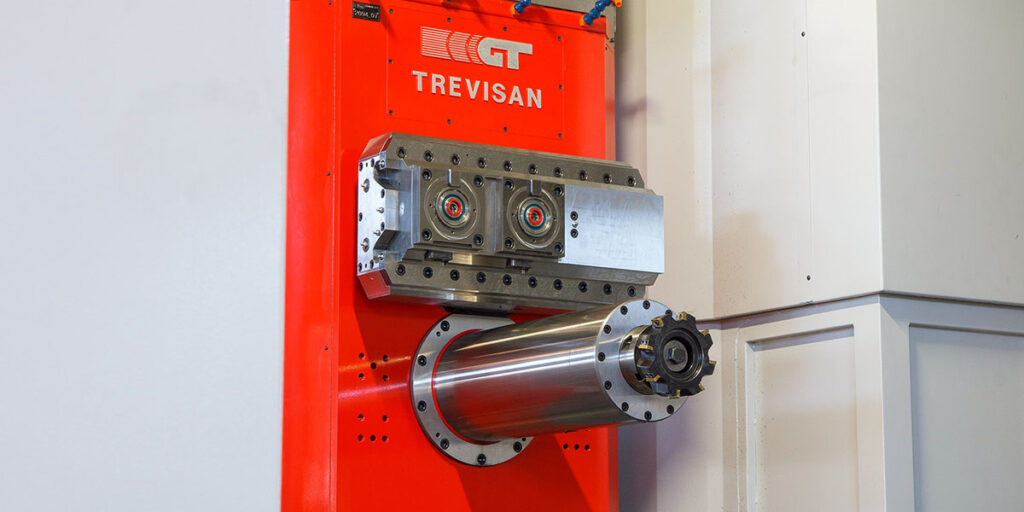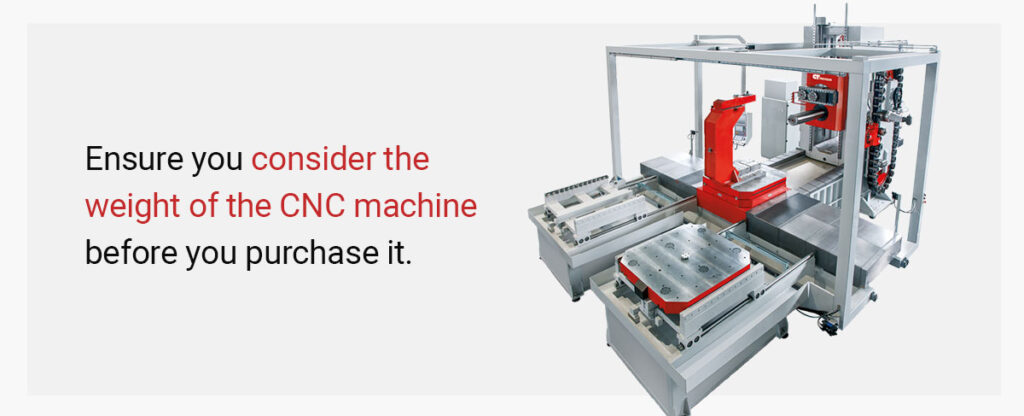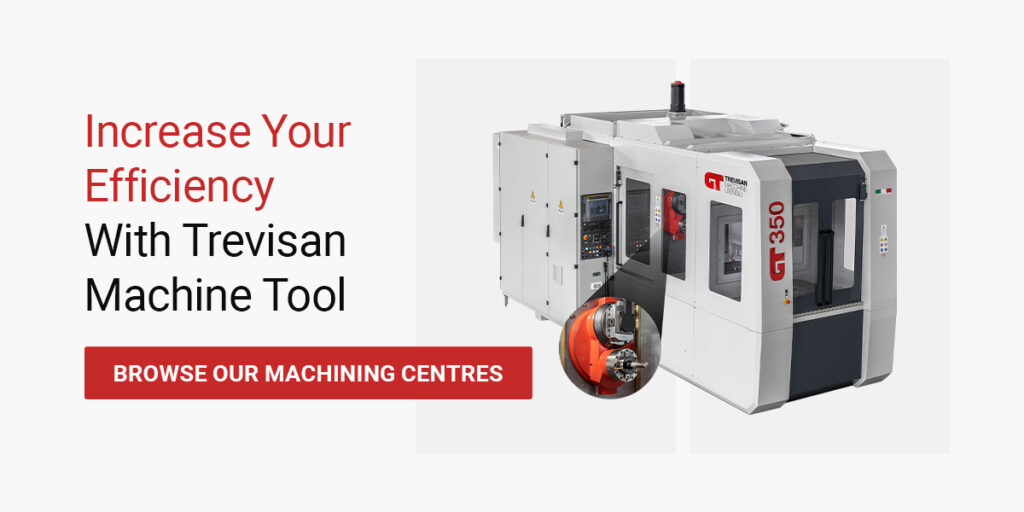
Computer numerical control (CNC) machining centers are powerful, innovative equipment that can benefit multiple industries. Their complex capabilities allow companies to improve their machining quality while reducing manufacturing time. However, they are a substantial investment and require careful consideration before purchase.
In this guide, you’ll learn what factors you should consider when selecting a machining center for your business. We also cover some common applications for CNC machines within the industrial, energy, automotive and aerospace industries.
Most Popular CNC Machines
The two most popular and used commercial CNC machines are the lathe and mill. They’re also the best CNC machines to start with, as they can machine both simple and complex parts, depending on your needs.
- Mill: A CNC mill rotates a cutting tool to remove material from a stationary workpiece. It’s suitable for parts that need flat surfaces, grooves or holes.
- Lathe: A CNC lathe turns the workpiece on a central axis while the stationary cutting tool removes material to shape and profile it. It’s best for cutting cylindrical parts.
Some other CNC machines include routers and plasma, laser and water jet cutters.
How to Choose a CNC Machine
The best CNC machine for your business is one that falls within your budget and has all the required features. Below are five factors you can consider to narrow your options and find the optimal machine for your application.
1. Functionality
CNC machines have various tools that perform different functions. They can mill, grind, contour, turn, drill, tap, bore, rough, face and more. Decide what tools you need to achieve the desired shape and choose a machine accordingly. Sometimes, you’ll use tools that are similar in nature but require different machine functionality. For example, you can use the same tool to turn a workpiece as you can bore a workpiece, but the machine would need different functionality to perform either cut.
You can also consider a CNC machine with an automatic tool changer to swap out tools without manual intervention. For example, Trevisan’s horizontal milling machines feature an integrated facing head that can perform various functions within one machine. We also offer a more specialized Modulo Equipe turning center that can hold up to six different tools per turret.
2. Speed
A CNC machine has two main speeds — the spindle speed and feed rate. Feed rate is how far the tool moves across the workpiece during one spindle revolution. It’s measured in inches per minute. Spindle speed is the rotational speed of the machine’s spindle, measured in revolutions per minute.
Speed is necessary to consider in your selection, as different applications need specific feed and spindle rates. The right speed will maximize the machine’s efficiency and precision. In addition, the right feeds and speeds are essential for the quality of the cut or material removal. Speed will also affect how much power the machine uses and how quickly the tool wears down.
3. Axes
CNC machines have varying axes for tool movement, and most CNC machines have around two to five axes. A machine with more axes can complete detailed, complex designs and cut the workpiece from multiple angles. A CNC machine with fewer axes may be sufficient if you have simpler requirements.
Some processes require a machine with a specific axis to perform the necessary functions. For example, some processes would be more efficient if you could adjust the diameter of a hole without manually moving the tool. Horizontal CNC mill machines from Trevisan Machine Tool feature an additional U-axis that meets this need.
4. Weight

Ensure you consider the weight of the CNC machine before you purchase it. Weight can impact the machine’s life span and machining quality.
Heavier machines can withstand the constant movement and forces from the machine’s daily operations, reducing wear and tear and helping the machine last longer. Machines also generate vibrations, which affect the finished piece’s quality and accuracy. Heavier machines can absorb vibrations better than lighter ones.
A lighter machine is sufficient if you only need it for smaller operations, but you’ll need a sturdier machine for demanding work. Trevisan’s heavy-duty horizontal milling centers are strong enough to handle greater production demands.
Keep in mind that the rating capacity of your facility’s flooring should play a role in your decision. A heavier machine will require an adequate concrete foundation underneath it to absorb the movement and vibrations of the machine while in use. Upgrading your facility’s flooring may be necessary for installation.
5. Orientation
CNC machines typically come in either a horizontal or vertical orientation. Vertical machines have a spindle that sits perpendicular to the work table. They use gravity to help secure the workpiece and have the ability to use variable-size cutting tools to make precise cuts.
Horizontal machines have a spindle that sits parallel to the work table. Their thicker tools and horizontal orientation allow them to make deeper cuts into the workpiece while the chips fall away safely.
At Trevisan, we offer both horizontal and vertical machining centers to suit your requirements.
CNC Machine Industry Applications
Businesses across a broad range of industries use CNC machines to create the complex parts they need. They also help manufacturers reach strict quality standards and produce consistent results, making them invaluable assets. The following are some examples of industries that use CNC machining centers to improve their machining processes:
- Industrial: Industrial manufacturers use CNC machines to create various tools, equipment and components. Some examples of specific industrial applications include industrial pumps, construction equipment and impellers.
- Energy: The energy industry relies on CNC machines to produce thousands of durable components that can withstand harsh and hazardous environments. This includes wind turbine nacelles, valves, fluid ends and flanges. Many of the pieces also require tight concentricity tolerance.
- Automotive: Automotive manufacturers use CNC machines to increase production efficiency in the face of growing demand. Gearboxes, engine blocks and axles are examples of components this industry creates with CNC machining centers.
- Aerospace: The aerospace industry is responsible for producing vehicles and systems that can cost people’s lives when manufactured incorrectly. Consequently, they need CNC machines to create complex, accurate and heavy-duty parts that can withstand high pressures and temperatures. Some examples of aerospace components include propellers, valves and gearbox housings.
Why Trust Us for CNC Machining?
Established in 1963, Trevisan Machine Tool has over 60 years of experience in the CNC machining industry. We are pioneers of contour head development and specialize in innovative horizontal machining centers. We know CNC machines inside and out and understand what it takes to help businesses increase their production and profit.
Our knowledge and experience with CNC machines allow us to find the perfect solutions for our customers, regardless of how complex their requirements are. When they can’t find what they need from standard solutions, we design and develop custom machines to meet their exact specifications.
Increase Your Efficiency With Trevisan Machine Tool
Businesses can drastically improve their efficiency and throughput by partnering with Trevisan Machine Tool. Our CNC machines can complete multiple steps in one setup with their dual spindle design and stationary part machining. They also offer faster cutting speeds and can machine a broader range of products than traditional machines.
We focus on providing the best solutions and services to our clients. Our training programs and on-call support allow us to assist our customers with their new machines. Additionally, all of our machines come with in-depth operation manuals. We can work with you to generate the right programs, tooling and fixturing for your machining processes.
Browse our range of machining centers today. Want to learn more? Contact our team by calling 860-254-5120 or by filling out a form!

